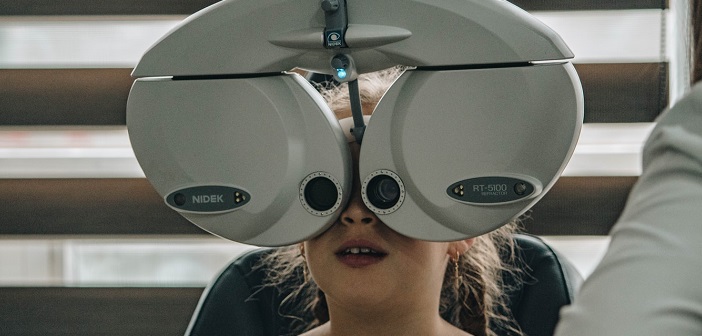Online classes have gone from supplemental lessons to fully replacing traditional classrooms as schools have postponed onsite learning until further notice. With that, an unintended consequence is the damage incurred to eyes while staring at a screen, as students are spending upwards of seven hours a day working on the computer.
In order to find out how to prevent damage to the eyes, Dr. Wu Yunyan from the Ophthalmology department of Beijing United Family Hospital provided suggestions and advice on how to protect your children’s eyes as they conduct their studies online.

Dr Wu Yunyan Ophthalmologist, Associate Chief Physician
1. It is important to use proper reading and writing posture when studying. You can follow the three “ones” to correct your posture:
- The finger should be an inch away from the tip of the pen
- Eyes should be at least a foot away from the book
- Keep your chest about a fist’s length from the edge of the table (have a space a big as your fist between your chest and the desk)
Make sure not to let children study while lying down or leaning on the desk.
2. Try to read from physical copies instead of digital reading via computers and iPads. Strictly control the screen time and encourage children to take a ten-minute break once every 30-40 minutes after using an iPad or computer, reading, writing, drawing, playing with Legos, or playing the piano. Children should take a break while engaging in any activity that requires them to be near any object they’re using.
Due to the epidemic, try to stare at a distance from the window or a yard during the ten minutes. Parents can also accompany the children to play games for ten minutes such as throwing darts together. Because it might be boring for children to play by themselves, parents can accompany the children and do things together to ensure they relax their eyes effectively.
3. Watch TV for less than 30-40 minutes at a time. Only watch TV once or twice a day. Watch TV from a distance of at least three meters, and preferably five times the distance from the screen.
4. Make sure to have some physical exercise every day. You can choose some home exercises, such as rope skipping, push-ups, hacky sack, or even play table tennis at home.
5. Keep a regular daily schedule to ensure your child gets eight to ten hours of sufficient sleep.
6. Keep a reasonable and balanced diet. Try to have more fruits and vegetables, less sweets, and eat more whole foods. Chewing is known as an alternative “eye exercise” and can prevent the occurrence of Myopia. If you are exposed to less sunlight, try to consume at least ten micrograms of vitamin D3 a day.
7. For the children who wear the orthokeratology lenses, they should keep wearing them. Do not take them off often just because they are not going outside as much. If they have any discomfort, you should communicate with your doctor as soon as possible to solve the problem.
Dr. Wu said, to protect the eyesight and prevent myopia, children and parents need to work together, especially during the period of e-learning from home.
Ultimately, parents should help children control the time that they use digital products, guide their children to finish the courses, and divert their attention to other things they are interested in. At the same time, parents should also lead by example; reduce time on mobile phones and iPads in front of their children, and increase emotional interaction with their children, to allow for more spiritual company.
Dr. Wu Yunyan has nearly 20 years of clinical experience with diagnosis and treatment of children strabismus, amblyopia, ametropia, visual fatigue diagnosis, and treatment; She has years of knowledge dealing with every kind of glasses, soft corneal contact lens, hard corneal contact lens (RGP), orthokeratology lens (OK lens), and low vision lens. In addition to the diagnosis and treatment of common ophthalmic diseases, Dr. Wu can independently complete most of the external eye surgery and strabismus surgery.
Photos: courtesy of Beijing United Family Hospital, unsplash




